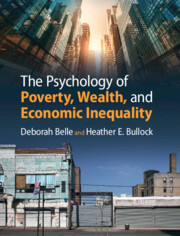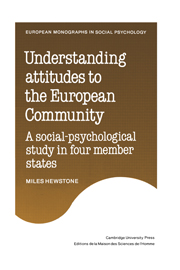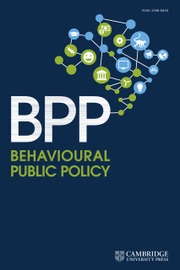The Wealth Paradox
Economic Prosperity and the Hardening of Attitudes
£22.99
- Authors:
- Frank Mols, University of Queensland
- Jolanda Jetten, University of Queensland
- Date Published: May 2017
- availability: In stock
- format: Paperback
- isbn: 9781107439139
£
22.99
Paperback
Other available formats:
Hardback, eBook
Looking for an inspection copy?
This title is not currently available on inspection
-
The West is currently in the grip of a perfect storm: a lingering economic recession, a global refugee crisis, declining faith in multiculturalism, and the rise of populist anti-immigration parties. These developments seem to confirm the widely held view that hardship and poverty lead to social unrest and, more specifically, scapegoating of minorities. Yet in this provocative new book, Mols and Jetten present compelling evidence to show that prejudice and intergroup hostility can be equally prevalent in times of economic prosperity, and among more affluent sections of the population. Integrating theory and research from social psychology, political science, sociology, and history, the authors systematically investigate why positive factors such as gratification, economic prosperity, and success may also fuel negative attitudes and behaviours. The Wealth Paradox provides a timely and important re-evaluation of the role that economic forces play in shaping prejudice.
Read more- Challenges the widespread and oft-repeated assumption that economic crises provide fertile soil for popular unrest and far-right voting
- Will appeal to social psychologists, political scientists, sociologists, and any other social scientist interested in societal tensions and intergroup conflict
- Serves as an important reminder that far-right parties can succeed without an economic crisis, but also that it is not necessarily those at the bottom of the social ladder who fear immigration most
Reviews & endorsements
'Mols and Jetten present a compelling case for the importance of the wealth paradox. This timely and fascinating book should serve as essential reading for all those interested in the continuing debate about economic conditions and hostilities towards minorities and newcomers.' Maykel Verkuyten, Universiteit Utrecht, The Netherlands
See more reviews'A game-changer! Analyses of xenophobia typically focus on the anxieties of those at the bottom of the hierarchy. The authors carefully unsettle the academic and lay assumptions behind that focus and problematise the status concerns of the comparatively well-off. This is a provocative book of immense contemporary significance.' Nick Hopkins, University of Dundee
'The Wealth Paradox is a timely, clear and important corrective to the traditional social science assumption that only harsh times and contexts produce xenophobia and prejudice. Mols and Jetten integrate data and theory from history, social psychology, political science and psychology to craft an analysis of relative advantage that will change the way we think about the relationship between wealth and prejudice.' Heather Smith, Sonoma State University, California
'This book is an impressive deep dive into the motives of 'people from relatively well-to-do circles', uncovering their leadership role in the protests of the less privileged. The scientific analysis of how and why prosperity also affects intergroup relations calls for a collective responsibility for combatting increasing global inequality.' Inga Jasinskaja-Lahti, University of Helsinki, Finland
'… this book deserves an audience beyond academia: this is myth-busting at its most politically useful.' The Times Higher Education Supplement
Customer reviews
Not yet reviewed
Be the first to review
Review was not posted due to profanity
×Product details
- Date Published: May 2017
- format: Paperback
- isbn: 9781107439139
- length: 236 pages
- dimensions: 229 x 152 x 12 mm
- weight: 0.39kg
- contains: 57 b/w illus. 2 maps 4 tables
- availability: In stock
Table of Contents
Part I. What We Know (Or Think We Know):
1. Recognising the elephant
2. Tracing the origins of 'harsh times' assumptions
3. Empirical evidence for the 'harsh times producing hard attitudes' hypothesis
Part II. Broadening our Horizon: The 'Wealth Paradox':
4. Rethinking the relationship between wealth and tolerance: national, regional and local trends
5. Development aid, charitable giving and economic prosperity
6. The relative nature of wealth
Part III. Understanding the 'Wealth Paradox':
7. Towards an explanation of the wealth paradox: introducing social identity theorising
8. The wealth paradox explained
9. The missing link: crafty politicians galvanising latent sentiments
Final words.
Blog
POLSIS Research in Profile The Wealth Paradox Frank Mols and Jolanda Jetten
Sorry, this resource is locked
Please register or sign in to request access. If you are having problems accessing these resources please email [email protected]
Register Sign in» Proceed
You are now leaving the Cambridge University Press website. Your eBook purchase and download will be completed by our partner www.ebooks.com. Please see the permission section of the www.ebooks.com catalogue page for details of the print & copy limits on our eBooks.
Continue ×Are you sure you want to delete your account?
This cannot be undone.
Thank you for your feedback which will help us improve our service.
If you requested a response, we will make sure to get back to you shortly.
×








